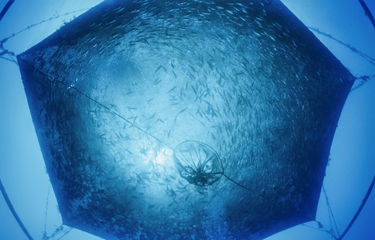A new report by an American think tank on the state of the U.S. aquaculture industry highlights the challenges and opportunities facing domestic seafood farming in state and federal waters.
The Washington, D.C., U.S.A.-based Center for American Progress found that aquaculture offers major economic benefits, but it must be balanced with regulations to ensure the proper location, farm management practices, and species selection.
The authors, Alexandra Carter and Miriam Goldstein, addressed the debate over the regular framework necessary to expand mariculture in federal waters, offering analysis on where the industry is today and how agencies and industry stakeholders can move forward.
Carter and Goldstein primarily saw a lack of information on the industry and they wanted to create an educational non-biased product, Carter told SeafoodSource.
“We wanted to provide a briefing of the sector,” Carter said. “We wanted to frame the project around the question on whether we should expand aquaculture into federal waters or not.”
Right now, Carter is encouraged to see the positive response from the industry and policymakers and hopes the report will provide a “baseboard” for other NGOs (non-governmental organizations) and think tanks to follow up and do their own ocean aquaculture analysis projects.
“While there has been congressional interest in regulating offshore aquaculture for a least a decade, it can best be characterized as intermittent,” the authors wrote in the report.
NOAA’s National Marine Fisheries Service (NMFS) attempted to clarify this regulatory thicket in 2016. Acting through the regional council process of creating a fishery management plan for farmed fishes, the NMFS implemented the Fishery Management Plan for Regulating Offshore Aquaculture in the Gulf of Mexico.
However, that management plan has been held up in the courts.
The rule was based on a general counsel’s interpretation that the inclusion of the term “harvesting” in the definition of the term “fishing” within the Magnuson-Stevens Fishery Conservation and Management Act (MSA) – the primary federal law governing U.S. fisheries management – applied to harvesting farmed fish as well as wild fish. It would have created a NMFS-run regulatory program for managing aquaculture in the federal waters of the Gulf of Mexico.
Courts and Congress
Last year, the U.S. District Court of Louisiana issued an opinion denying the NMFS’ final rule, halting implementation of the management plan for the Gulf of Mexico.
The judge wrote: “It is often said that ‘Congress does not hide elephants in mouse holes,’ and this court cannot imagine a more fitting example. Had Congress intended to give the NMFS the authority to create an entirely new regulatory permitting scheme for aquaculture operations, it wold have said more than ‘harvesting.’”
The court’s decision stopped the NMFS from permitting aquaculture under the MSA, leaving congressional action as one of the only options for improving the aquaculture development process in U.S. federal waters. Rep. Don Young (R-Alaska) has highlighted this point repeatedly in Congress.
On 1 May, 2019, Rep. Young reintroduced H.R. 2467, a bill that would prohibit federal agencies from permitting finfish aquaculture in federal waters unless and until Congress passes a future law authorizing such permits.
Some members of Congress, however, have been less strident in their discussions and proposals to regulate the industry.
In the previous session of Congress, Mississippi republican Senator Roger Wicker (R-Mississippi) introduced the Advancing the Quality and Understanding of American Aquaculture (AQUAA) Act, which proposed sweeping changes to various regulatory processes that apply to aquaculture.
Rep. Steven M. Palazzo (R-MS) and Rep. Collin C. Peterson (D-MN) introduced a House companion bill, H.R. 6966.
The AQUAA Act was aimed at fostering relatively fast industry development in federally-managed American waters and found strong support among industry groups such as Stronger America Through Seafood, an aquaculture trade group supported by more than a dozen seafood producers, processors, and large corporations. The bill was not voted on by the full U.S. Senate or House in the previous congressional session and has not yet been reintroduced this Congress.
Aquaculture remains a top priority for Wicker, who is currently the chairman of the U.S. Senate Committee on Commerce, Science, and Transportation, according to his office.
Seafood for thought
In the report, Carter and Goldstein provided analysis of, and answers to, some of the most pressing questions facing the U.S. aquaculture sector. Specifically, they ask whether and how the United States should facilitate aquaculture permitting and development in federal waters, and what safeguards are necessary for sustainable and environmentally responsible aquaculture.
The report’s authors concluded that because of the complex nature of permitting offshore aquaculture, policymakers should consider its many possible effects on the environment and the economy before legislating a new national permitting process.
Studies have shown that there are benefits and risks associated with aquaculture, all of which should be taken into account when creating a sustainable progressive plan if aquaculture is to be expanded in the U.S.
In 2016, American marine aquaculture production was valued at more than USD 400 million (EUR 357.7 million) by a study cited in the report. While this is small compared with other types of livestock farming – the U.S. poultry industry, for example, is valued at USD 48.3 billion (EUR 43.2 billion), coastal communities have realized significant social and economic benefits from aquaculture. In Maine, for instance, aquaculture supports more than 100 aquaculture businesses and more than 1,000 jobs, and 73 percent of aquaculture businesses interviewed by the University of Maine Aquaculture Research Institute expect sales to increase in future years, the report stated.






